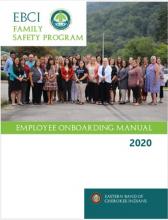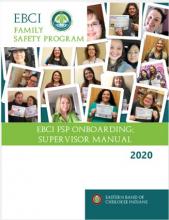Onboarding Program
The QIC-WD coordinated with the Eastern Band of Cherokee Indians (EBCI) Family Safety Program (FSP) to create an onboarding program for child welfare social workers. The intervention was designed to address role clarity, social integration, and understanding of Cherokee history and culture for new hires. (For more information see the Site Overview.) The 5-week onboarding program included activities completed by the new employee, his/her supervisor, and other FSP team members. Onboarding program elements included:
- A structured, interactive review of FSP’s policies and procedures;
- A mock family case to illustrate the full case process;
- Content related to Cherokee culture, historical grief and trauma, and culturally sensitive practice; and
- Shadowing all FSP team units to gain understanding of all aspects of work performed within FSP.
Two manuals were developed: (1) the Supervisor Manual to provide guidance to the supervisor on how to assist his/her new hire and (2) the Employee Onboarding Manual.
 Weeks 1 and 2 of the onboarding program oriented new staff to the organizational structure, mission, purpose, philosophy, and practice of FSP. These first two weeks also provided an introduction to Cherokee culture through various activities. New staff also watched a video in which the supervisors of the various units describe the role of each team and they learn about the practice model.
Weeks 1 and 2 of the onboarding program oriented new staff to the organizational structure, mission, purpose, philosophy, and practice of FSP. These first two weeks also provided an introduction to Cherokee culture through various activities. New staff also watched a video in which the supervisors of the various units describe the role of each team and they learn about the practice model.
EBCI contracted with local, cultural experts to develop two videos for new staff about Cherokee history and culture, as well as guidance for working with EBCI families. New hires also completed an activity to increase awareness of implicit bias. To become acquainted with the community they serve, new staff were provided a tour of the community by an experienced FSP social worker and were able to visit the local Museum of the Cherokee Indian free of charge. Staff met with a cultural ambassador (an enrolled EBCI member) to discuss the cultural activities and ask any questions in a safe learning environment.
Weeks 3 through 5 involved learning about each of the team units within FSP by reading and answering questions about relevant sections of policy, following a fictional family through their unfolding “case,” and shadowing workers from each team. Supervisors were closely involved in the development of the hypothetical family case and the content relevant to their team’s role to ensure the onboarding materials accurately reflected everyday case practice. New workers reviewed narrative descriptions and agency forms about the hypothetical family’s case and then answered questions that incorporated knowledge from sections of policy they reviewed.
 An integral part of the onboarding program was shadowing workers from each of FSP’s five teams. The purpose of shadowing was to learn about the role and tasks of each team and to build relationships across teams. Each unit supervisor assisted with identifying the key tasks new staff should observe. Examples of tasks included observation of a referral being received and documented, observation of various types of visits and court proceedings, observation of child and family team meetings, and practice completing forms.
An integral part of the onboarding program was shadowing workers from each of FSP’s five teams. The purpose of shadowing was to learn about the role and tasks of each team and to build relationships across teams. Each unit supervisor assisted with identifying the key tasks new staff should observe. Examples of tasks included observation of a referral being received and documented, observation of various types of visits and court proceedings, observation of child and family team meetings, and practice completing forms.
New staff also met with their supervisor each week to discuss what was learned during onboarding and to begin building a positive worker-supervisor relationship. A supervisor manual complements the worker’s onboarding manual and provides guidance to the supervisor to assist their new hire through the initial weeks of employment. The weekly check-ins involved asking the worker about their reactions to what they learned and addressing any barriers. It provided an opportunity for the worker to ask questions and served as a reminder for the supervisor to assist with scheduling activities for the coming week. During these meetings, the worker was also provided with a handout containing the answers to the knowledge questions they completed during the previous week, thus ensuring they had accurate information.